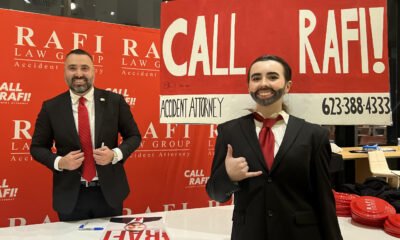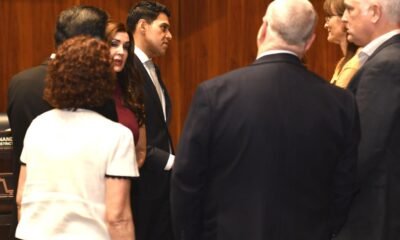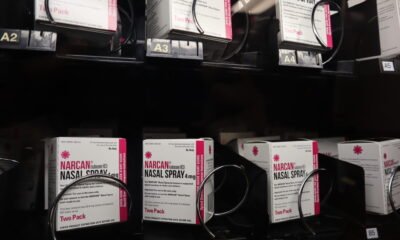Business
RFK Jr. Stifles Measles Queries at Arizona ‘Make America Healthy Again’ Rally

U.S. Health and Human Services Secretary Robert F. Kennedy Jr. received a warm reception from supporters of the Make America Healthy Again initiative at the Arizona Senate on Tuesday. The gathering included a notable appearance by comedian and anti-vaccine activist Rob Schneider, who expressed his approval while Kennedy praised two Republican-backed health bills recently passed by the state legislature.
One bill aims to request a federal waiver to restrict Supplemental Nutrition Assistance Program (SNAP) recipients from purchasing soda. The other, which achieved unanimous bipartisan support, seeks to remove ultra-processed foods from school lunches. “This is a historic moment of leadership for our state,” stated Sen. Janae Shamp, R-Surprise. “Arizona is prioritizing the health of our citizens, especially children, over corporate interests.”
Despite the accolades for the legislation, the atmosphere turned tense when a reporter inquired about the government’s response to a measles outbreak linked to the unvaccinated. This outbreak has tragically resulted in the deaths of two children and one adult. “Let’s talk about food!” Kennedy retorted, as supporters drowned out the reporter’s question.
While Kennedy has long advocated against vaccines, he recently acknowledged the importance of the MMR vaccine as a preventative measure against measles. Sen. Shamp, who has a background as a nurse, previously lost her job for refusing the COVID-19 vaccine.
House Bill 2164, aimed at banning ultra-processed foods in federally funded school meal programs, is set for potential approval by Democratic Governor Katie Hobbs. However, Hobbs has a history of vetoing legislation lacking bipartisan support, making the future of another proposed bill, House Bill 2165, uncertain.
Both bills were introduced by Rep. Leo Biasiucci, R-Lake Havasu City, who emphasized Kennedy’s role in raising awareness about harmful food ingredients. He criticized the lack of priority given to food safety by previous administrations, drawing attention to the food dyes and chemicals banned in Europe but allowed in U.S. food products, as well as rising obesity and chronic disease rates.
Initially, the SNAP legislation sought to prohibit recipients from buying candy and soda, but amendments limited it to soda after food industry opposition. Democrats argued for increased access to healthy foods in underserved areas, rather than constraints on SNAP purchases.
Kennedy alleged, without substantial evidence, that opponents of the SNAP bill were influenced by soda industry donations. An amendment proposed by Democratic Sen. Theresa Hatathlie, which would have restricted legislative spending on soda, was defeated by Republican votes.
Biasiucci asserted that the new legislation would significantly benefit schoolchildren. However, critics pointed out that the Trump administration previously canceled $1 billion intended for school food programs, including over $13 million designated for healthier meals in Arizona.
Moreover, the rollback of environmental regulations during the Trump era, affecting pollution standards, was also highlighted by public health advocates. Arizona Democrats held a press conference preceding Kennedy’s address, where Attorney General Kris Mayes criticized the inconsistency of the administration’s health claims alongside cuts to funding for medical research. Hatathlie further emphasized ongoing health issues faced by the Navajo Nation, linking them to abandoned uranium mines.


















